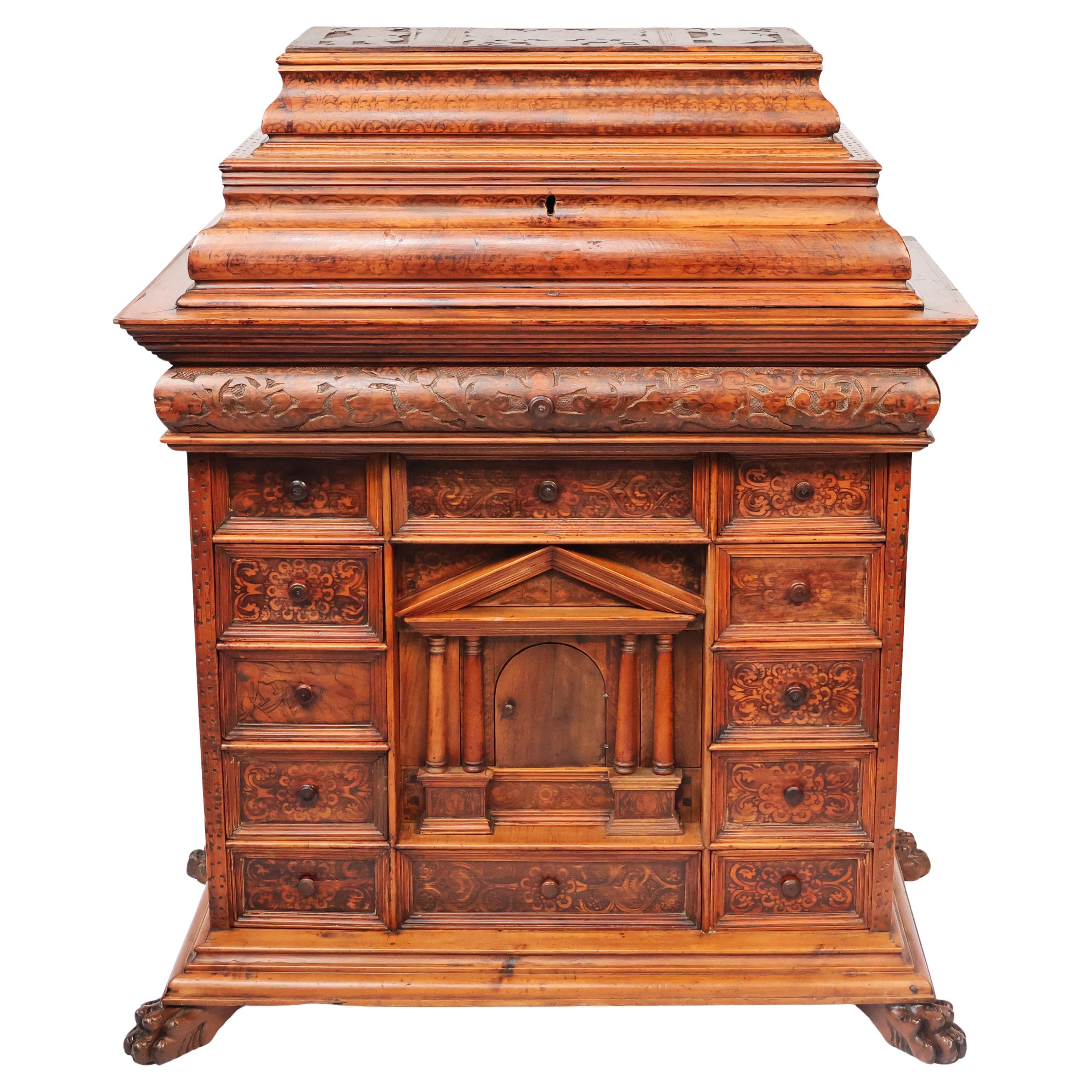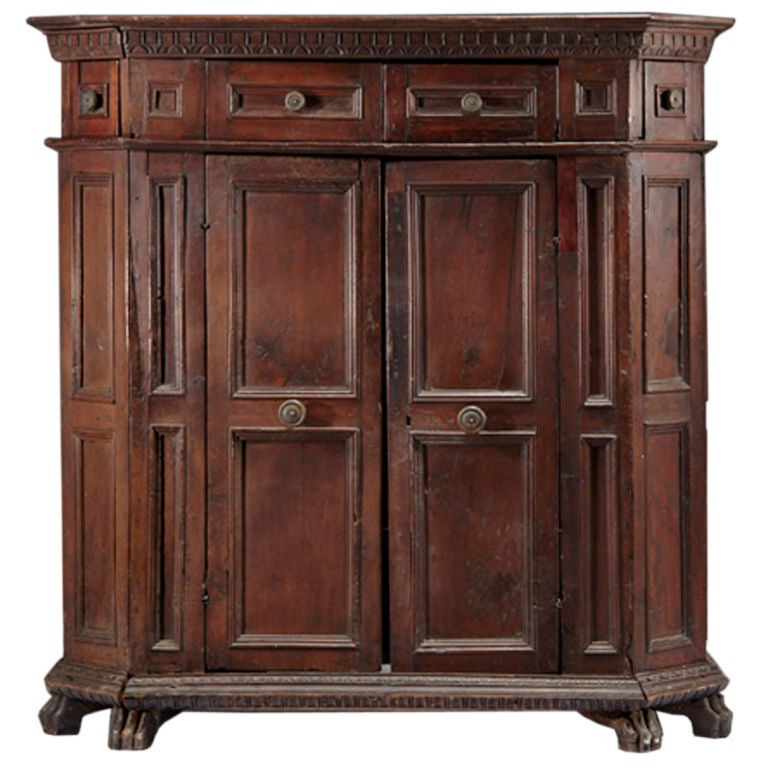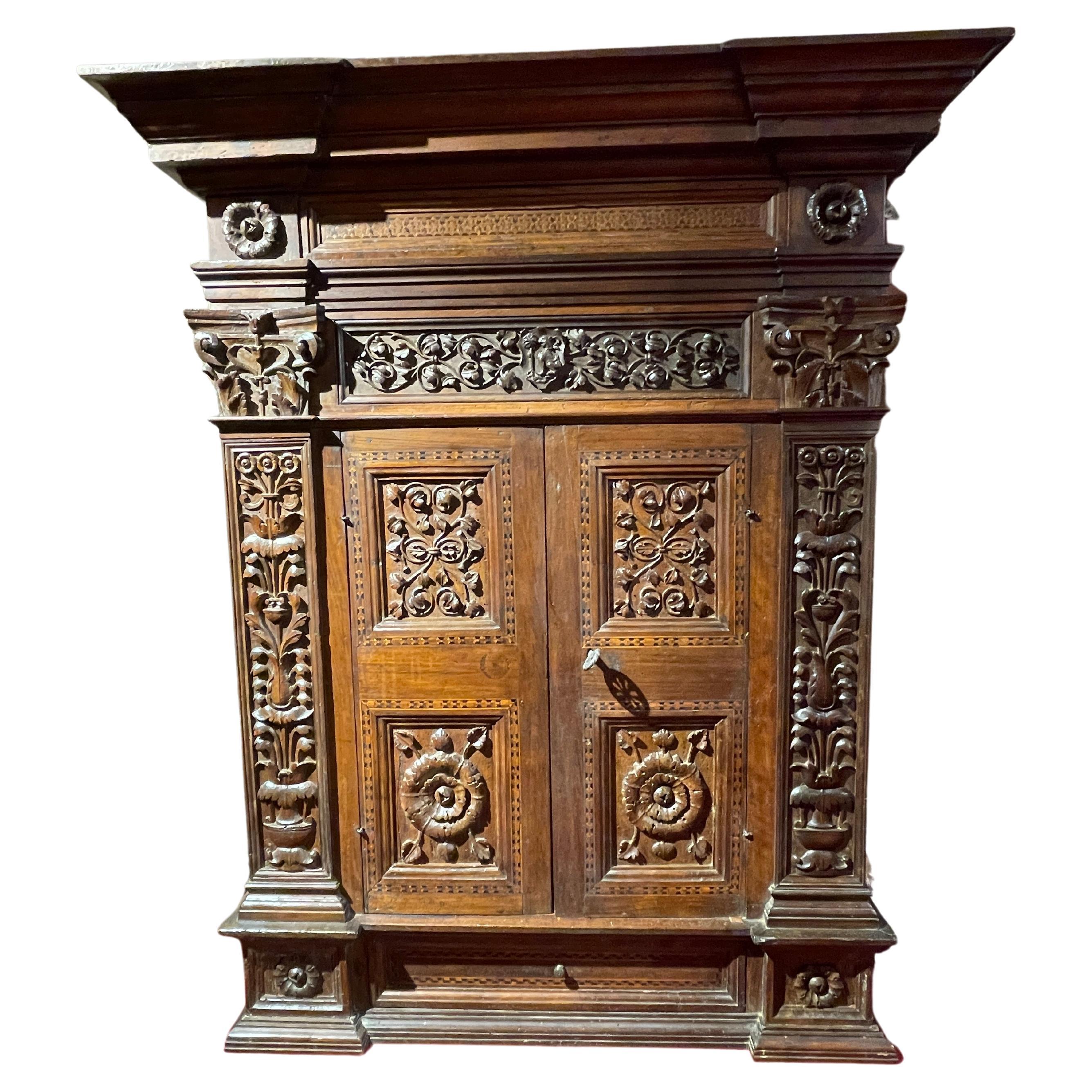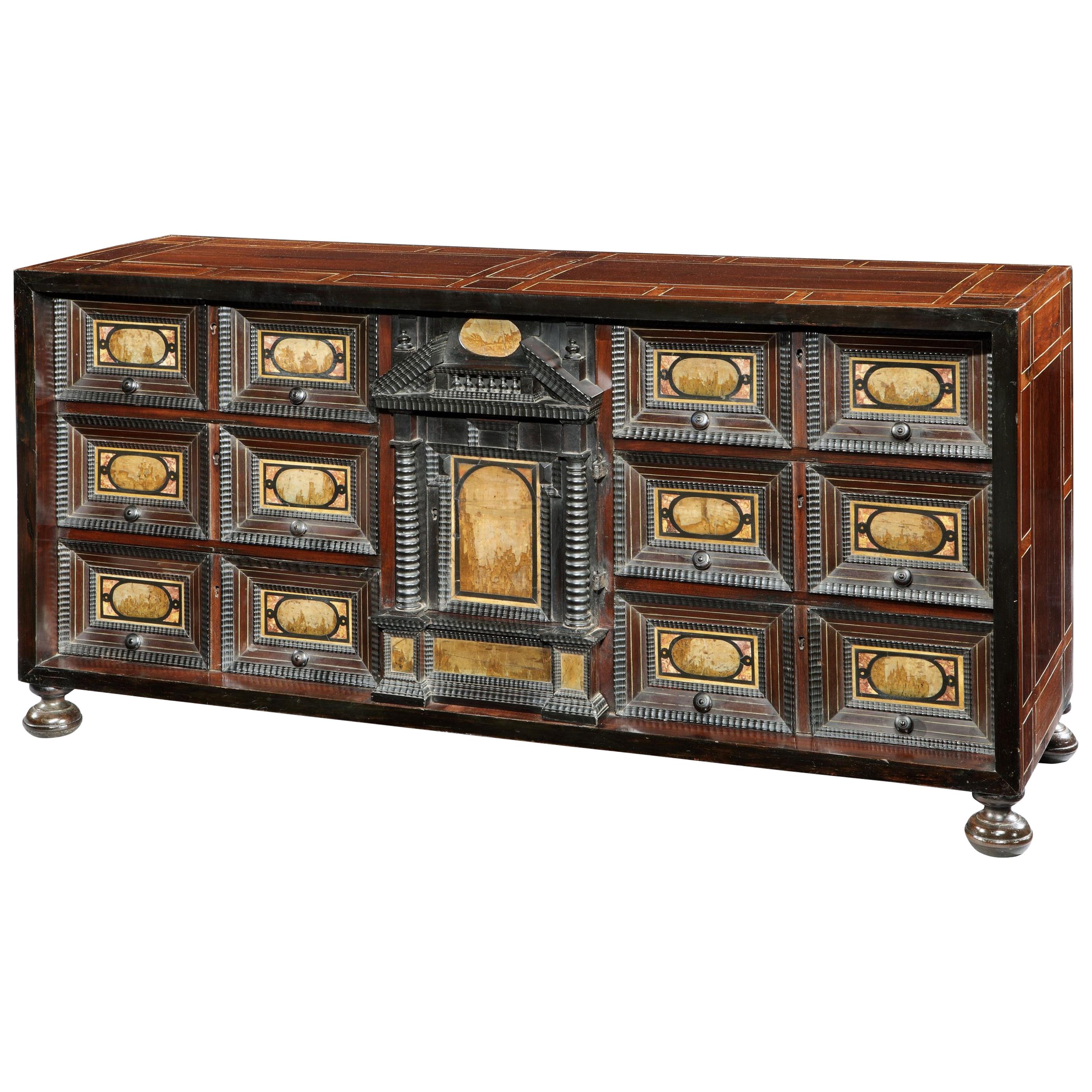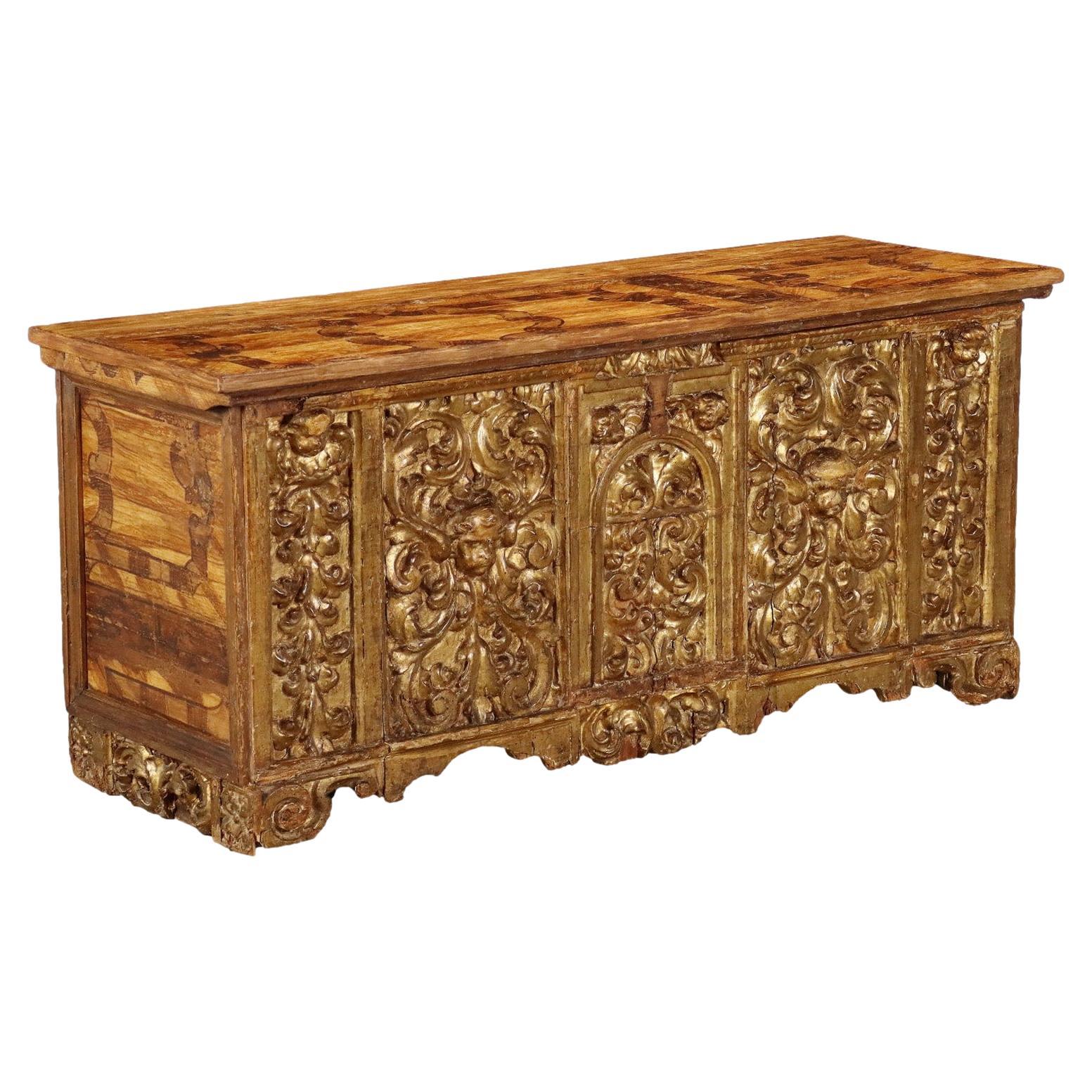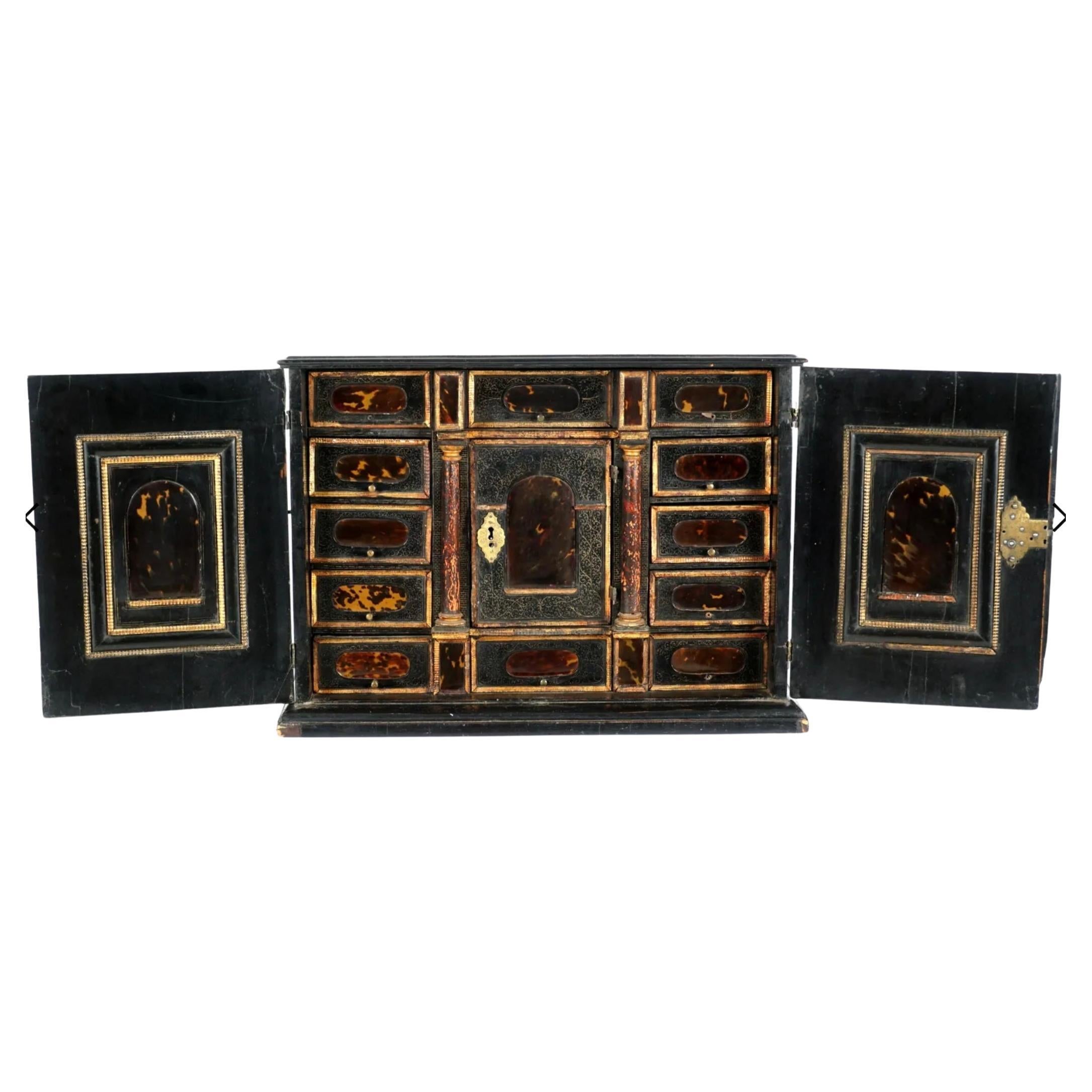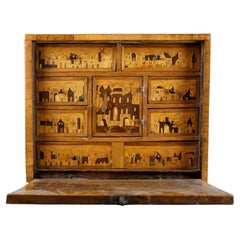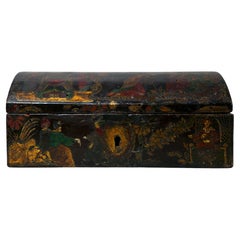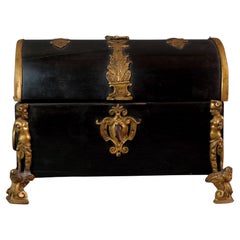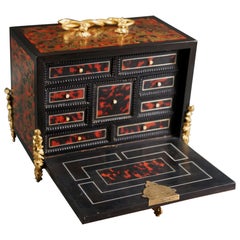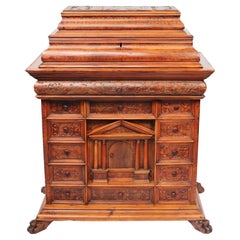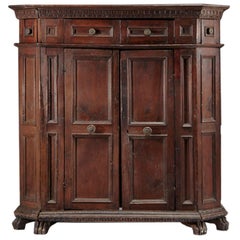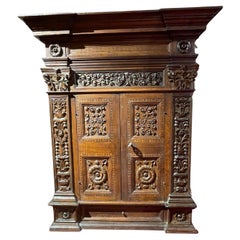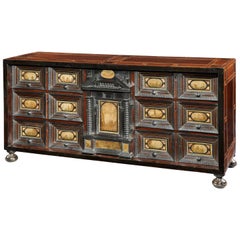Items Similar to 16th century Venetian Cabinet Lacquered Wood "Persian style" collectible
Want more images or videos?
Request additional images or videos from the seller
1 of 13
16th century Venetian Cabinet Lacquered Wood "Persian style" collectible
$10,076.83
£7,547.22
€8,500
CA$14,144.44
A$15,472.41
CHF 8,061.33
MX$186,167.86
NOK 102,086
SEK 95,848.97
DKK 64,743.63
About the Item
Exceptional lacquered and gilded wooden cabinet, Venice, last quarter of the 16th century.
The architectural facade is centered on a gable supported by columns reminiscent of ancient temples, flanked by drawers. Hidden inside is a secret drawer.
The entire surface is lacquered and gilded on a dark background with a decoration called "à la Persane."
This cabinet is decorated with "gilded lacquer," a painting that imitates, in composition, drafting technique, and ornamental motifs to which it was applied, that of Near Eastern, Turkish-Ottoman, and Persian lacquers.
For a long time, studies have been devoted to 18th-century European Chinese lacquer imitating Far Eastern, Chinese and Japanese lacquer.
Professor A. González-Palacios has recently shown that the first lacquers produced in Europe were made in Venice rather in the second half of the 16th century, under the influence of models from the Muslim world.
In this history of cultural exchanges between Venice and the Islamic East and of the surprising adherence of the workshops of the Serenissima to the models of Islamic art transferred to Western design objects, a key role was played by Islamic bindings, the main means of transmission to Venetian craftsmen of Eastern techniques and ornamental motifs. The sheer sumptuousness and splendor of the Islamic manuscripts and the Turkish-Ottoman and Persian bindings explain the impact of these works on the artisans of the lagoon and the role played by the humanists in the spread of this art.
The link between Islamic ligatures and Venetian lacquers has never been clearer than in Venetian cabinets whose exterior facades are designed as a framed ligature.
There is a small wrought-iron family seal attached to the drawer.
Measurements
L cm 27
D cm 16
H cm 25
- Dimensions:Height: 9.85 in (25 cm)Width: 10.63 in (27 cm)Depth: 6.3 in (16 cm)
- Style:Renaissance (Of the Period)
- Materials and Techniques:Wood,Lacquered
- Place of Origin:
- Period:
- Date of Manufacture:about 1590
- Condition:Wear consistent with age and use. Minor losses. Minor fading. Accompanied by certificate of eportation. Professional packing in wooden crate, shipping by DHL or UPS courier.
- Seller Location:Pistoia, IT
- Reference Number:1stDibs: LU10131242367592
About the Seller
No Reviews Yet
Vetted Professional Seller
Every seller passes strict standards for authenticity and reliability
Established in 1997
1stDibs seller since 2024
Typical response time: <1 hour
- ShippingRetrieving quote...Shipping from: Pistoia, Italy
- Return Policy
Authenticity Guarantee
In the unlikely event there’s an issue with an item’s authenticity, contact us within 1 year for a full refund. DetailsMoney-Back Guarantee
If your item is not as described, is damaged in transit, or does not arrive, contact us within 7 days for a full refund. Details24-Hour Cancellation
You have a 24-hour grace period in which to reconsider your purchase, with no questions asked.Vetted Professional Sellers
Our world-class sellers must adhere to strict standards for service and quality, maintaining the integrity of our listings.Price-Match Guarantee
If you find that a seller listed the same item for a lower price elsewhere, we’ll match it.Trusted Global Delivery
Our best-in-class carrier network provides specialized shipping options worldwide, including custom delivery.More From This Seller
View AllAugsburg Cabinet 17th Century Inlay High Epoch Wunderkammer Iron Engraved
Located in Pistoia, IT
Rare and valuable collectible coin cabinet richly inlaid in precious woods, Augsburg manufacture, second half of the 17th century.
The coin cabinet opens with a drop front that reve...
Category
Antique 17th Century German Baroque Sideboards
Materials
Wood
17th Century Venetian Lacquered and Gilded Collectible Box
Located in Pistoia, IT
Rare and precious Venetian domed case made of richly lacquered and gilded wood, early 17th century, depicting "The Conquests of Venice."
Caskets like this one are more unique than ...
Category
Antique Early 17th Century Italian Baroque Decorative Boxes
Materials
Wood
Early 17th Italian Renaissance Box Set Ebony, Gilded Bronze and Gemstones
Located in Pistoia, IT
Rare and valuable ebony-plated domed case with rich gilt bronze decoration and central jasper medallion.
Italian Renaissance manufacture from the early 17th century.
The production...
Category
Antique Early 17th Century Italian Renaissance Decorative Boxes
Materials
Bronze
Marqueterie Boulle coin cabinet signed "SUSSE Frères" Napoleon III era
By Susse Freres
Located in Pistoia, IT
Exceptional Boulle inlay coin set bearing the signature "Susse Frères," Paris, Napoleon III era, circa 1870. This rare jewel belongs to the luxurious production of the Victor and A...
Category
Antique 1870s French Napoleon III Sideboards
Materials
Bronze
French Chest of Drawers in Marqueterie louis XV style Napoleon III era
Located in Pistoia, IT
Lovely small french dresser of Louis XV style, Napoleon III era, second half of the 19th century.
With wavy sides, richly inlaid on three sides, it is decorated with golden bronzes...
Category
Antique 1880s French Napoleon III Commodes and Chests of Drawers
Materials
Marble, Bronze
French console table Louis XV period in Natural Oak Wood Marble top
Located in Pistoia, IT
Impressive Louis XV oak console table with Rance marble top. Period first half of the 18th century.
Rare and magnificent French Louis XV console table of the 18th century, made of o...
Category
Antique 18th Century French Louis XV Console Tables
Materials
Wood
You May Also Like
Wooden coin cabinet, northern Italy, late 18th century early 19th century
Located in Brescia, IT
Description
Walnut and cedar wood coin cabinet, carved and painted. Linear front punctuated by twelve drawers framing a portal surmounted by a gable, which can be opened and removed,...
Category
Antique Early 19th Century Italian Neoclassical Revival Sideboards
Materials
Wood
Italian early 17th century Baroque armadio / Cabinet
Located in Troy, NY
Striking Tuscan cabinet with canted corners. Four drawers above two doors, on later paw-feet (can be taken off).
Beautiful rich color.
Our pieces are left in lived-in condition, pe...
Category
Antique 17th Century Italian Baroque Wardrobes and Armoires
Materials
Walnut
Rare Renaissance Florentine Cabinet with Certosina Decoration
Located in Saint-Ouen, FR
RARE RENAISSANCE FLORENTINE WALNUT CABINET WITH CERTOSINA DECORATION
ORIGIN: FLORENCE, ITALY
PERIOD: END OF 15th CENTURY – BEGINNING OF 16th CENTURY
Height: 129 cm
Length: 107 cm...
Category
Antique 16th Century Cabinets
Materials
Walnut
Table Cabinet, Early 17th Century, Italian Baroque, Pietra Paesina Mounted Walnu
Located in BUNGAY, SUFFOLK
This cabinet is one of a small group that were made in the 1620s as taste and fashion veered towards the use of a paesina stone with its characteristic evocative veining which exhibi...
Category
Antique Early 17th Century Italian Baroque Cabinets
Materials
Marble
Wooden Chest Carved and Gilded Italy 19th Century
By Non-Standard Furniture and Lighting
Located in Milano, IT
Chest built from wood dating back to the 17th century. Top and sides made of painted wood, undercounter frame and richly carved and gilded front depicting putti in the central reserv...
Category
Antique Early 1800s Italian Other Cabinets
Materials
Giltwood
17th Century Italian Tortoiseshell Table Cabinet
Located in Bradenton, FL
17th century Ebonized case with parcel gilt decoration, iron handles and hinges. Fitted interior with inset tortoiseshell panels surrounded by brass filigree inlaid ebonized wood drawer and door fronts. Faux painted architectural columns on either side of center door which opens to reveal an additional set of small drawers. A rare early cabinet...
Category
Antique 17th Century Italian Renaissance Cabinets
Materials
Tortoise Shell
More Ways To Browse
Antique Piccolo
16th Century Italian Wood
Ferro Battuto
Colonne Antique
Diffusione Arte
Maurizio Duranti
Open Top Chest
Oval Sideboard
Peter Lovig Nielsen Sideboard
Plinio Dassi
Queen Anne Walnut Sideboard
Red Lacquer Chinese Sideboards
Rounded Edge Cabinets
Sideboard With Brass Rail
Tv Lowboard
Victorian Sideboard Marble Top
Vintage 1960s G Plan Sideboard
Vintage 50S Sideboard
